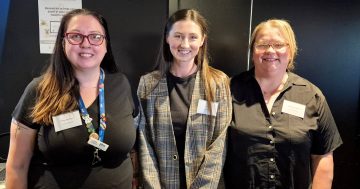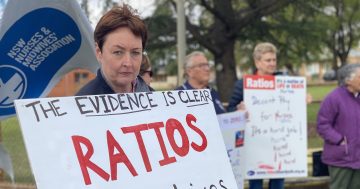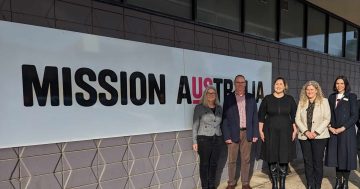
Helaina Beltrame has pinpointed gaping holes in rural mental health care. Photo: Oliver Jacques.
University student Helaina Beltrame has bravely chronicled the dire state of mental health care in rural areas by sharing her own experience, saying she’s been waiting more than a year to access support services since moving back to her home town of Griffith.
“There is a gaping hole in the system for people with complex and ongoing mental health needs or illnesses like myself,” she said.
The 25-year-old said the system was hampered by a chronic shortage of specialists, excessive bureaucracy and poorly targeted funding arrangements. She said she knew of several other young people in small towns who can’t get the help they need, which was contributing to a brain drain from rural Australia.
Ms Beltrame wants to see the Medicare subsidy for telehealth reinstated and a radical overhaul of the health system to ensure it’s able to cater to those with complex needs before they reach a crisis point.
“I was diagnosed with autism at age 10,” she said. “My Mum had to take my brother and I to Albury to see a speech therapist and occupational therapist every month, there was none in Griffith.
“In my late teens, I needed to see psychologists for anxiety and depression, but it was so hard to find anyone.
“There are services for low-level needs and more typical mental health issues like stress, anxiety and low mood online and in person, often with free access … [while] government mental health services function through a medical model and are targeted at acute and high-risk service users, those at risk of harm to themselves or others … [but] the medical model in place and lack of funding doesn’t allow for continuous service users: those who aren’t in crisis but still need care.
“The biggest blessing for my access to medical services was moving to Sydney [for university]. I could go to Headspace, which was free for those under 25.”
Ms Beltrame said while services were most accessible, the system in big cities was far from perfect.
“When I needed a psychiatrist, I had to drive to Wollongong because it was too expensive in Sydney,” she said.
“You have to pay $600 for the test, then if you want the report done it’s another $400. Then, it’s $600 for a 15-minute appointment just to refill my medication. Who can afford that?”

Photo: Region Media.
But following a breakdown and moving back to Griffith to be close to family, life has been even more challenging.
Ms Beltrame has been able to study her Sydney University philosophy degree remotely and progress her singing career – having been cast in a musical production of The Wedding Singer. But obtaining the support she needs has been a struggle.
“I’m still on a waitlist for a support service. I signed up a year ago and they still haven’t rung me back. The are some amazing services here, they are doing their best, but are so overloaded.”
She said those trying to get help had to navigate a bureaucratic minefield.
“You can’t just get mental health help like you can access a physio, where you can book an appointment and see them.
“First you have to see a GP and get a referral … you have to make phone calls, search online, it’s like you have to have 50 appointments before you get a proper appointment.”
She said COVID had been “a blessing” for many rural people who didn’t have access to psychologists in their town, because the federal government made telehealth eligible to be subsidised through Medicare. But that benefit has since been taken away.
“If you’re in a rural area, often the only option is telehealth. Now, you’re paying for it out of your own pocket. It needs to be subsidised.”
But ultimately, Ms Beltrame wants to see a radical overhaul of the Government’s priorities.
“I’d like to see an injection of funding to restructure rural community supports and services so it can be more useful to a wider variety of people … it’s so disjointed, there’s just little pockets of services, everything needs to be connected.
“The [$368 billion] being spent on submarines is not going to help anyone because the problem is right now. Ignoring our health problems is going to cause more problems for us in 20 years than foreign countries will.
“Anyone in the neurodivergent community knows you can’t function without the right support. Any conversation about increasing productivity and efficiency needs to start with improving the wellbeing of people in our communities.”
















